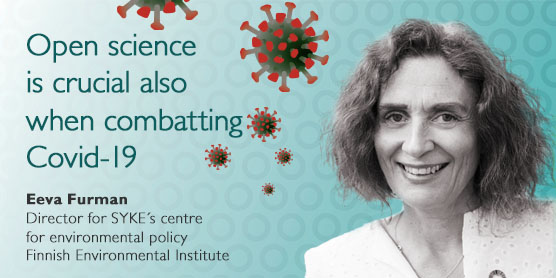
The recent article by
Yuval Noah Harari
gave an interesting analysis on how virus epidemics could be prevented
(Time-magazine, 20.3.2020)
. In his article, Yuval Harari raised the importance of trust: on existing scientific knowledge, on needs of further scientific activities and on other nations and other people. His convincing analysis based on a historical outlook from previous outbursts of pandemic epidemics.
When the Covid-19 epidemic had already started in China, I was sitting in a UN science technology innovation workshop on sustainable development in Vienna. It was the first week in February. What made me really alert was a panel discussion on open science and its importance when implementing the Agenda 2030. In a highly connected world, it is impossible to get on sustainable paths, unless we transform towards sustainability in all parts of the world. For that we need scientific knowledge from every single country on this planet. There is, however, very different capacities for research in the developing and developed countries. Open science demonstrates this in the most striking form.
Epidemic shows how important open science is when managing global challenges
The Covid-19 epidemic shows how important open science is when managing global challenges. It took only one week from the early stages of Covid-19 when all relevant research institutions – both public and private – had opened their data and infrastructure for free use, globally. This happened for the first time during the Zika epidemic and now the process was used for the second time.
Tackling a virus epidemic reveals how difficult it is to enhance sustainable development. The fast solution to combat an epidemic would be to come up with a suitable vaccine. But from the perspective of sustainable development, it is not the whole story. One needs to identify and foresee various societal interlinkages, the most outstanding of which are the economic disturbances and chains to follow, all caused directly or indirectly by the epidemic. These have fundamental impacts on the direction the development will take after the disturbance in various countries.
Foreseeing disturbances and dealing with them is a prerequisite for making solid progress with sustainability transformations. For this, scientific knowledge is needed. When production chains are becoming shorter, number of flights drastically drop, the water is getting clear in the channels in Venice and peoples´ worldview takes new forms, one may see these as positive signs. However, it is important to keep in mind the message of Yuval Harari where he reminds us to look at the world as One.
It could be that we are one step closer the paths towards sustainability
The Covid-19 epidemic has witnessed already now that human society of today is able to make major global actions when so needed. Unfortunately, this does not, as yet, imply the whole world, as clearly demonstrated by Ethiopia’s prime minister Abiy Ahmed (Financial Times, 25.3) . To combat the Covid-19, acting in an integrated and science-based way, opening science for everyone and collaborating worldwide has materialized. In the turmoil of all the tragedy of the epidemic this gives hope. It could be that we are one step closer – even though tiptoeing unbearably slow – the paths towards sustainability, which allows justice and security take ground.
The first phases of managing the epidemic also gives hope that the boulders of sustainable development – the negative trends in inequalities, the loss of biodiversity, climate change and amounts of waste – can be turned through collaboration. At the best, open science and sustainable development go hand in hand.
Eeva Furman, director for SYKE´s centre for environmental policy uses the telescope to watch birds and to look into the future.
Opinions of blog contributors do not necessarily reflect the official views and opinions of the Finnish Environment Institute.